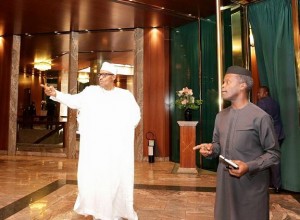
FOR a country seeking answers to the fundamentals of its existence, the discordant tunes from the highest echelons of the Federal Government on restructuring are retrogressive. At two separate public engagements in a space of one week, Vice-President Yemi Osinbajo and President Muhammadu Buhari expressed widely divergent views on the make-or-break issue of Nigeria’s political system. The dissonance on restructuring at this level is outrageous for, without it, Nigeria is not a viable union.
Osinbajo said that the Federal Government was not against restructuring the country, which is music to the ears of advocates of federalism. “We are fully in support of any form of restructuring that will benefit the people of this country,” Osinbajo told traditional rulers in Ekiti State. With diverse multi-ethnic, multicultural and multi-religious entities in its fold, Nigeria opted for federalism ahead of Independence in 1960. The tables turned after the January 1966 coup: the military impostors dismantled the federal structure. All efforts since then to restore federalism have fallen flat.
A few days after Osinbajo’s declaration, the President discountenanced his deputy. Buhari argued that those calling for restructuring had ulterior motives. “You mentioned something which is topical these days: the call for the restructuring of Nigeria,” he told a delegation of Urhobo Traditional Rulers from Delta State. “Every group asking for restructuring has got its own agenda and I hope it can be accommodated by the constitution.” These contrary views are signs of the unfortunate contradictions in government.
In other words, Buhari is comfortable with the current structure. He finds solace in a system that vests too much power in the centre – at the expense of the federating units. Along this line, Buhari shocked the system in his New Year speech last January. He stated, “When all the aggregates of nationwide opinions are considered, my firm view is that our problems are more to do with process than structure.” As this newspaper said then, Buhari missed the point.
This flawed system is at the root of the economic, social and political crises hindering national cohesion. The fault lines – Buhari pretends to ignore them – are clearly so visible. There are vociferous concerns about insecurity, a rent economy that is not geared towards production but only about sharing oil resources. A constitution that allocates 56 per cent of all revenues to the government at the centre, while the 36 states beg for the income they generate, cannot be labelled a federal system.
Under this structure, the economy has atrophied. Currently, the country is struggling with a budget of $23 billion for 193.3 million people. Joblessness is very high at 18.80 per cent; the national debt stock is N23.7 trillion (March 2018). This has worsened poverty. According to a new report by the Brookings Institution, Nigeria has overtaken India as the country with the highest population of extremely poor people with 87 million persons in the sorry state. The African Development Bank says 80 per cent of Nigerians are so poor that they live under the $2 per day World Bank threshold.
Insecurity is threatening the very fabric of the union. Amnesty International estimates that 1,813 casualties have been recorded in Fulani herdsmen attacks in 2018 alone. Plateau State communities have been under siege from herders’ attacks in the past two weeks, leading to about 200 deaths. In Zamfara State and Southern Kaduna, banditry has assumed an alarming proportion. With centralised policing architecture, kidnapping, armed robbery and cross-border banditry serially claim lives.
If Buhari is to be believed, then the All Progressives Congress is just playing tricks with the issue of federalism. At the height of agitation for restructuring in 2017, the ruling party had set up the Committee on True Federalism as a way of affirming its election campaign pledge of reworking the political system. Among other salient submissions, the committee, chaired by Governor Nasir el-Rufai of Kaduna State, had recommended the devolution of powers to the states and state police. It canvassed a reduction in the 68 items on the Exclusive Legislative List in the 1999 Constitution, and the ceding of those powers to the state governments. With hindsight, the caveat from el-Rufai that the President would take the final decision on the report was just to deflect the agitation and buy time. If the APC were serious, it would have given a timeline for the implementation of the report.
We believe that restructuring, in which the Federal Government sheds its excess powers, local governments are under the jurisdiction of states, and resources are controlled by states, who contribute an agreed percentage to the centre, while retaining the bulk. Devolution of policing power is the way forward. This ideal is in operation in the United States, Australia, Belgium and Canada, all federal entities. Conversely, Yugoslavia disintegrated in the 1990s when it failed to accommodate the interests of the diverse ethnic nationalities competing for attention.
With the Buhari government impervious to public yearning for restructuring, the country is now more divided than ever. The solution, therefore, lies with the electorate. In the 2019 general election, voters should scrutinise the candidates for the top offices based on their professions, antecedents and advocacy on restructuring. Any candidate that does not present iron-cast agenda on how to implement the restructuring of the country ought to be rejected outright.
END

Be the first to comment